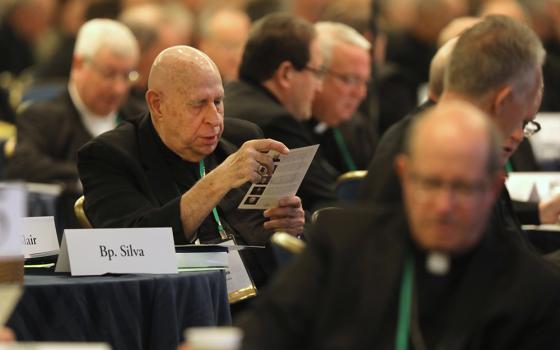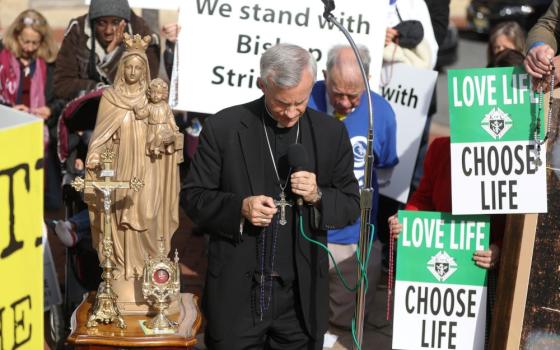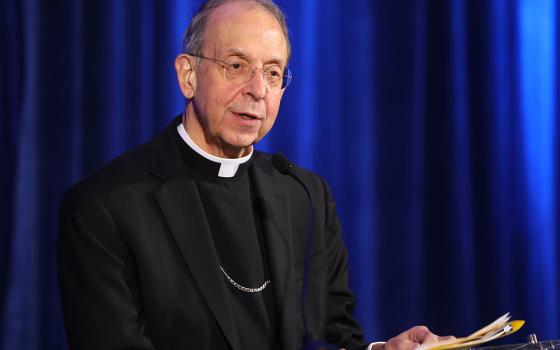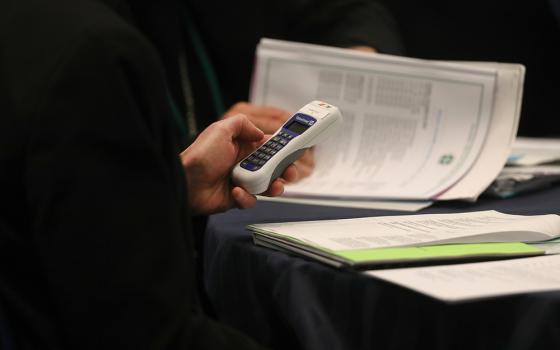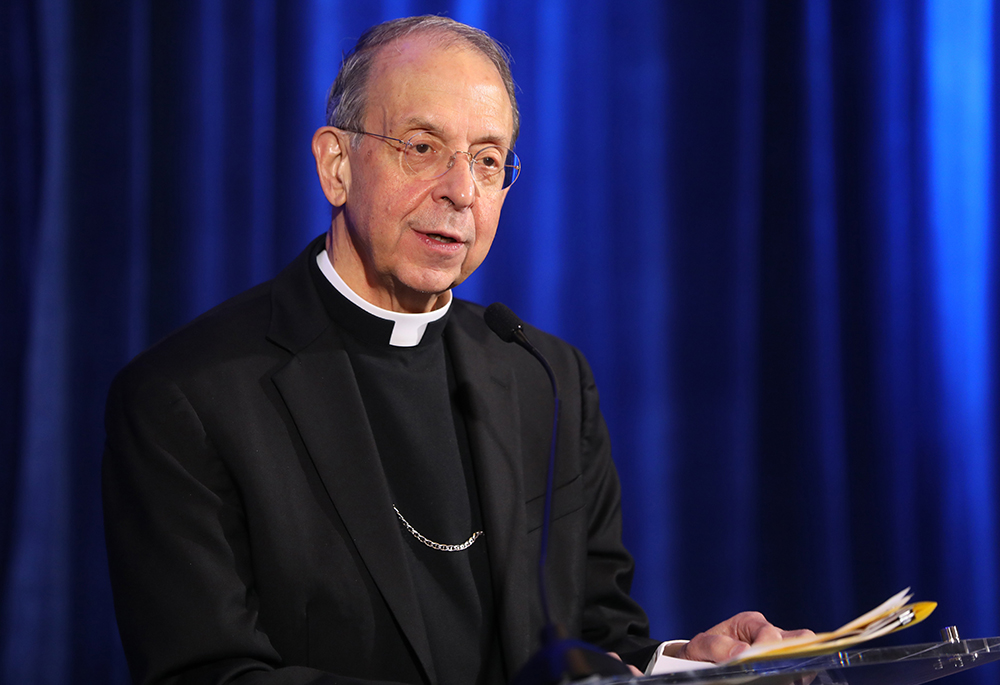
Archbishop William Lori of Baltimore, vice president of the U.S. bishops' conference, speaks during a news conference at a Nov. 15, 2023, session of the bishops' fall general assembly in Baltimore. The bishops approved supplements to "Forming Consciences for Faithful Citizenship" -- a teaching document on the political responsibility of Catholics. (OSV News/Bob Roller)
The U.S. Catholic bishops decided on Nov. 15 at their general assembly here that "the threat of abortion" will remain the "preeminent priority" for their political guidance to Catholic voters in the year leading up to the 2024 presidential election.
In voting to approve language that echoes their 2019 introductory letter to a document known as "Forming Consciences for Faithful Citizenship," the bishops chose to continue prioritizing their outspoken anti-abortion advocacy over what they describe as "other grave threats to life," such as climate change, gun violence, racism and health care inequities.
Asked by reporters if the new letter downplayed the catastrophic threats of climate change, which Pope Francis emphasized in his new apostolic exhortation Laudate Deum, Baltimore Archbishop William Lori said abortion was a more imminent threat to vulnerable human life.
"It does not make [ecological concerns] less serious, but this does affect how we have weighed out things," said Lori, vice president of the bishops' conference, who led a task force of bishops' conference committees in drafting a new introductory letter and bulletin inserts to accompany "Faithful Citizenship."
An earlier draft of the introductory letter, obtained by NCR, said abortion would remain "a preeminent priority" because of the vulnerability of "the innocent child in the womb." On Nov. 15, the bishops approved an amendment to add language saying abortion "directly attacks our most vulnerable brothers and sisters and destroys more than a million lives per year in our country alone."
Arlington, Virginia, Bishop Michael Burbridge, the chairman of the bishops' Committee on Pro-Life Activities, proposed that amendment with his committee's support.
Wheeling-Charleston, West Virginia, Bishop Mark Brennan and Kansas City, Kansas, Archbishop Joseph Naumann had proposed their own amendments to underscore abortion's preeminence for the U.S. hierarchy. Naumann's amendment proposed adding that the bishops sought the "prevention of the inevitable emotional and spiritual scarring of post-abortive parents." Those amendments did not pass.
The bishops did not debate or discuss the "Faithful Citizenship" supplemental materials during their Nov. 15 public session, and they voted to approve the agenda item 225 to 11. Lori noted that wide margin when a reporter asked him if the U.S. bishops' priorities were at odds with Francis'.
"Ecological concerns are hugely important, and must be addressed and we take utterly seriously both [documents] from Pope Francis on the subject and strive to implement them in our diocese, but we recognize that the effects of this are indirect rather than direct," Lori said.
In his 2015 encyclical "Laudato Si', On Care for Our Common Home" and in Laudate Deum, an apostolic exhortation released on Oct. 4, Francis emphasized climate change as an urgent crisis demanding humanity's immediate attention. In December, Francis is scheduled to become the first pope to attend a United Nations climate summit, COP28 in Dubai, to help promote global action on the issue.
Elsewhere, Francis has also taken a different approach from the U.S. bishops in frequently speaking about abortion in relation to the church's teachings and positions on other life issues, including the death penalty, social justice and anti-poverty initiatives, and treatment of migrants.
In Gaudete et Exsultate, his 2018 apostolic exhortation on holiness, Francis said the church's "defense of the innocent unborn" needed to be "clear, firm and passionate." But the pope said the lives of people already born were "equally sacred," and he highlighted issues such as human trafficking, poverty, euthanasia, "and every form of rejection."
Advertisement
At their November 2019 plenary, the U.S. bishops voted to identify abortion as their "preeminent priority" following a public debate where some prelates disagreed with that language, on grounds that it was inconsistent with Francis' teachings.
A year after that gathering, Democrat Joseph Biden was elected U.S. president. Biden's election prompted an at-times pointed debate among the U.S. hierarchy on whether to prohibit Catholic politicians like Biden who support abortion rights from receiving Communion. The controversy ended with the November 2021 approval of a document that summarized Catholic teaching on the Eucharist.
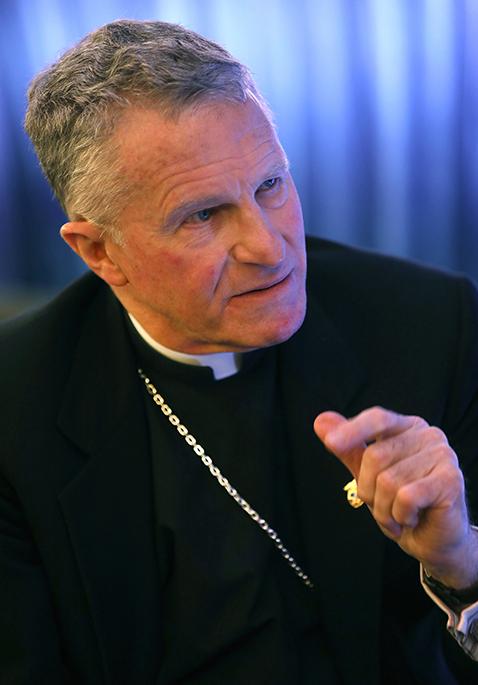
Archbishop Timothy Broglio of the U.S. Archdiocese for the Military Services, president of the U.S. Conference of Catholic Bishops, speaks during an interview with OSV News at the bishops' fall general assembly Nov. 15 in Baltimore. (OSV News/Bob Roller)
Seven months after that controversy subsided, in June 2022, the U.S. Supreme Court overturned its landmark 1973 ruling Roe v. Wade, which had declared abortion to be a federal constitutional right. Since then, while some states have moved to restrict abortion or widen access, voters in seven states over the past year have approved binding ballot referendums and amendments to preserve abortion rights, most recently in Ohio.
Despite those electoral setbacks, Archbishop Timothy Broglio of the U.S. Archdiocese for the Military Services, the president of the U.S. bishops' conference, told reporters Nov. 14 that the bishops see their role as one of educating voters that abortion is "simply not acceptable" since it is "an end to human life."
Said Broglio, "Perhaps we need to make our position clearer."
At their November 2022 plenary, the bishops opted to publish a new introductory letter and bulletin inserts, instead of rewriting "Faithful Citizenship." The bishops said they plan to begin revising "Faithful Citizenship" after the 2024 election, with the goal of preparing a new edition for approval at their November 2027 plenary.
The bishops last issued a new version of "Faithful Citizenship" in 2007.
Lori said the document has served the bishops' conference well, and he stressed that "Faithful Citizenship" is based on Catholic social teaching principles, adding: "It's not based on one's favorite political ideology."




